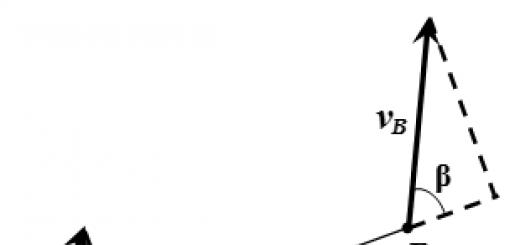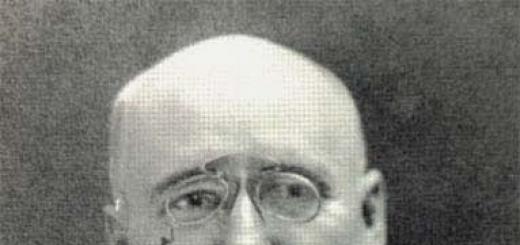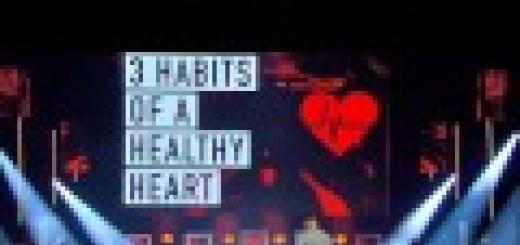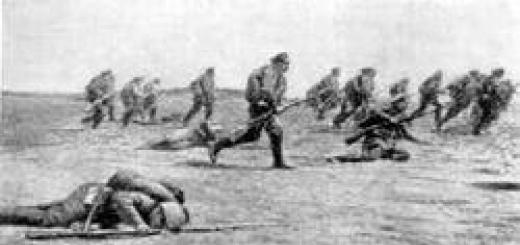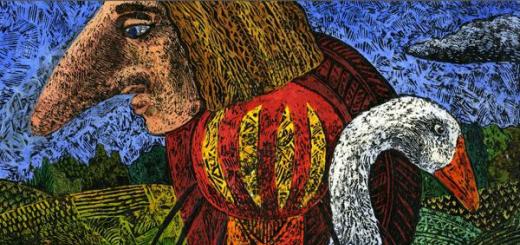In the memoirs of one German there is a mention of the battle cry of the German paratroopers “Horrido!” (and in some places they write that it was used in the Luftwaffe), it’s time to figure it out
What different nations shout to intimidate the enemy:
"Hooray!"- Russian (although many say that in the heat of battle they shout something completely different)
Main versions of origin:
from the Tatar word “ur” - that is, “beat”,
"urrr" - a South Slavic term meaning "let's take over"
from the Lithuanian word “virai (vir)” - “husbands, men”,
Bulgarian term “Urge” - that is, “up, up”,
from the Turkic exclamation “Hu Raj”, which can be translated as “In paradise!”,
from the Kalmyk “Uralan!”, which translates as “forward”.
There is an opinion that “Hurray!” not only Russians, but also Germans shout: “Hurra!”, the British: “Hurray!”, the French: “Hurrah!”, and the Italians: “Urra!”

A few more modern cries:
“Allah akbar” (God is great)- Arabs in particular and Muslims in general are really shouting at him.
“Banzai”, “Geika banzai!”, which can literally be translated as “Many years to the Emperor!” - Japanese.
“Manse”- Koreans,
“Wansui” - Chinese.
“Jai Mahakali, Ayo Gorkhali!” — (“Glory to the Great Kali, the Gurkhas are coming!”)- the battle cry of the Gurkhas.
"Viva la France!"- (“Long live France!”) - the French.
“Bole So Nihal, Sat Sri Akal” - “Victory is for the one who repeats the name of the Almighty!”- Sikhs.
“Ho-hoy!”- Kurds.
“Sigidi!”- Zulus.
"Hurra"- Finns.
“On the knife!”- Bulgarians.
Already obsolete, but probably used by specific units/armies:
“Alla!” (God)- this is how the soldiers of the Ottoman Empire shouted.
“Akharay!”- (Follow me!) in Hebrew - the battle cry of the ancient Jews.
“Bar-rr-ah!”- the cry of the Roman legionnaires, in imitation of the trumpet cry of war elephants
“Marga!” (Kill!)- the battle cry of the Sarmatians.
“Montjoie!” and “Saint-Denis” (abbreviated from “Mont-joie Saint-Denis” - “Our Defense Saint Dionysius”)- francs.
“Nobiscum Deus” (God is with us!)- so the Byzantines shouted.
“Caelum denique!” (Finally to heaven!) and “Deus vult” (God wants this)- battle cries of the crusaders.
“Beaucean!”- the cry of the Templars.
“White Dragon!”- the British.
"Santiago!" (“Saint James is with us”!)- call of the Spanish caballeros during the Reconquista and the conquistadors.
“Alba gu brath!” (“Scotland Forever”)!- the war cry of the Scots.
“Saryn on the kitchka!” - the cry of the ushkuiniki.
"Rebel yell"- Confederate battle cry during the American Civil War.
“Forvarts!”- “Forward” - this is how the Prussians and Austrians shouted.
"Alga!" (forward)- the cry of the ancient Kyrgyz, as well as the Kazakhs.
“Savoy!”(in honor of the ruling dynasty) - Italians shouted until the end of World War II.
Material from Wikipedia - the free encyclopedia
Battle cry- a loud call during battle, designed to encourage comrades, intimidate the enemy, or seek support from higher powers. In addition, the battle cry was an identification mark, allowing one to distinguish friend from foe in the thick of battle. Another useful function of the battle cry is to create a feeling of unity with comrades (the so-called feeling of comradeship).
Real cries
Ancient world (before 476)
Middle Ages (476 - end of the 15th century)
- Spain
- Santiago! ("Saint James [is with us]!") was a Spanish battle cry used by the conquistadors, among others.
- Czech
- Ktož jsú boží bojovníci(Old Czech - “Who are you, God’s warriors”) - a battle song of the Hussites, the first words of which became the motto of their movement. During the Battle of Domažlica, the crusaders fled as soon as they heard the battle song of the Hussites.
Modern times (end of the 15th century - 1918)
Recent times (since 1918)
Invented cries
- Kahka!- the battle cry of the aborigines of the planet Evur, used, in particular, by Billegurri (Belogurochka), from the science fiction novel “Dungeon of the Witches” by Kir Bulychev and the film of the same name.
- Logalogalogalog!- shout anthropomorphic shrews in Redwall.
- Eula-li-ah!- the battle cry of the inhabitants of the mountain fortress of Salamandastron in Redwall.
- Kawabanga!- shout the Teenage Mutant Ninja Turtles in the animated series and comics of the same name. And also the cry Kawabunga (Cowabunga and Kowabunga) has become a common cry of admiration among surfers.
- Baruk Khazad! Kazad i-menu!(Axes of the Dwarves! (or "Dwarves to the axes!") The Dwarves are advancing!) - the battle cry of the Dwarves in the works of J. R. R. Tolkien
- Uruk-hai!- the battle cry of the orcs from the works of J. R. R. Tolkien.
- Gondor!- the battle cry of the warriors of the kingdom of Gondor in the War of the Ring from the works of J. R. R. Tolkien. Some provinces had their own cries - among the knights of Dol-Amroth it was “Amroth for Gondor!”
- Auta and Lome!("Darkness vanishes!") is the battle cry of the Noldor.
- Waaagh!("Graaah!!") is the battle cry of the Orcs in Warhammer 40,000.
- For the emperor!- the battle cry of the Imperial Guard in the same Warhammer 40,000.
- Lok-tar ogar!(Victory or Death!) is the battle cry of the Orcs from Warcraft.
- Leeroy Jenkins- the battle cry of WOW star Ben Schultz.
- Entaro Adun! Entaro Tassadar!(For the glory of Adun! For the glory of Tassadar!) - The battle cry of the Protoss from the game Starcraft.
Write a review of the article "Battle Cry"
Notes
- Rinecker F., Mayer G.// Brockhaus Biblical Encyclopedia. - Christliche Verlagsbuchhandlung Paderborn, 1999. - 1226 pp.
- //Kazakh.ru
- State symbols
- Gérard de Sorval.= Le Langage secret du blason. - Paris: Albin Michel, 1981. - P. 65. - 232 p. - ISBN 2226010920.
- //britanniae.ru
- Charles Oman /Trans. from English V. P. Mikhailov - M.: Tsentrpoligraf, 2011. - 191 p. ISBN 978-5-9524-4945-9
- // Ammianus Marcellinus HISTORIAE LIBER XIX-XI 10
- // Collier's Encyclopedia. - Open society. 2000.
- // Andre Miller. "History of the Christian Church". In 2 vols. T. 1. / Andre Miller. B.m. : GBV, 1992. - 705 p.
- // Encyclopedic Dictionary of Brockhaus and Efron: in 86 volumes (82 volumes and 4 additional). - St. Petersburg. , 1890-1907.
- // Site of Asiaphile and Oriental lover
- Dmitry Makarov intertrend.ru
- US Airborne Forces //vdv-usa.ru
- - Shouting “Logalogalogalagalog” was the method of attracting the ferry shrew’s attention.
- Tolkien J. R. R. The Lord of the Rings. Trilogy. Book 3. Return of the King/J. R. R. Tolkien; Per. from English A. V. Nemirova. - M.: LLC “AST Publishing House”; Kharkov: “Folio”, 2002. - 429 p. ISBN 5-17-009971-1 (AST Publishing House LLC) Book. 3, ISBN 5-17-008954-6 (General), ISBN 966-03-1124-9 (Folio Publishing House) ( P. 442)
Excerpt describing the Battle Cry
“That’s when the fun begins,” thought Anatole and sat down next to the old prince with a smile.- Well, here's the thing: you, my dear, they say, were brought up abroad. Not the way the sexton taught me and your father to read and write. Tell me, my dear, are you now serving in the Horse Guards? - asked the old man, looking closely and intently at Anatole.
“No, I joined the army,” answered Anatole, barely restraining himself from laughing.
- A! good deal. Well, do you want, my dear, to serve the Tsar and the Fatherland? It's war time. Such a young man must serve, he must serve. Well, at the front?
- No, prince. Our regiment set out. And I'm listed. What do I have to do with it, dad? - Anatole turned to his father with a laugh.
- He serves well, well. What do I have to do with it! Ha ha ha! – Prince Nikolai Andreevich laughed.
And Anatole laughed even louder. Suddenly Prince Nikolai Andreevich frowned.
“Well, go,” he said to Anatoly.
Anatole approached the ladies again with a smile.
– After all, you raised them there abroad, Prince Vasily? A? - the old prince turned to Prince Vasily.
– I did what I could; and I will tell you that the education there is much better than ours.
- Yes, everything is different now, everything is new. Well done little guy! Well done! Well, let's come to me.
He took Prince Vasily by the arm and led him into the office.
Prince Vasily, left alone with the prince, immediately announced to him his desire and hopes.
“What do you think,” said the old prince angrily, “that I’m holding her and can’t part with her?” Imagine! – he said angrily. - At least tomorrow for me! I’ll just tell you that I want to know my son-in-law better. You know my rules: everything is open! I’ll ask you tomorrow: she wants it, then let him live. Let him live, I'll see. - The prince snorted.
“Let him come out, I don’t care,” he shouted in that shrill voice with which he shouted when saying goodbye to his son.
“I’ll tell you straight,” said Prince Vasily in the tone of a cunning man, convinced of the needlessness of being cunning in front of the insight of his interlocutor. – You see right through people. Anatole is not a genius, but an honest, kind fellow, a wonderful son and dear one.
- Well, well, okay, we'll see.
As always happens for single women who have lived for a long time without male society, when Anatole appeared, all three women in the house of Prince Nikolai Andreevich equally felt that their life had not been life before that time. The power to think, feel, and observe instantly increased tenfold in all of them, and as if it had hitherto been happening in darkness, their lives were suddenly illuminated with a new light, full of meaning.
Princess Marya did not think or remember at all about her face and hairstyle. The handsome, open face of the man who might be her husband absorbed all her attention. He seemed to her kind, brave, decisive, courageous and generous. She was convinced of it. Thousands of dreams about a future family life constantly arose in her imagination. She drove them away and tried to hide them.
“But am I too cold with him? - thought Princess Marya. “I try to restrain myself, because deep down I feel too close to him; but he doesn’t know everything that I think about him, and he can imagine that he is unpleasant to me.”
And Princess Marya tried and failed to be polite to the new guest. “La pauvre fille! Elle est diablement laide,” [Poor girl, she’s devilishly ugly,] Anatole thought about her.
M lle Bourienne, also raised to a high degree of excitement by Anatole's arrival, thought in a different way. Of course, a beautiful young girl without a certain position in the world, without relatives and friends and even a homeland, did not think of devoting her life to the services of Prince Nikolai Andreevich, reading books to him and friendship with Princess Marya. M lle Bourienne has long been waiting for that Russian prince who will immediately be able to appreciate her superiority over the Russian, bad, poorly dressed, awkward princesses, fall in love with her and take her away; and this Russian prince finally arrived. M lle Bourienne had a story that she heard from her aunt, completed by herself, which she loved to repeat in her imagination. It was a story about how a seduced girl introduced herself to her poor mother, sa pauvre mere, and reproached her for giving herself to a man without marriage. M lle Bourienne was often moved to tears, telling him, the seducer, this story in her imagination. Now this he, a real Russian prince, has appeared. He will take her away, then ma pauvre mere will appear, and he will marry her. This is how her entire future story took shape in M lle Bourienne’s head, while she was talking to him about Paris. It was not calculations that guided m lle Bourienne (she didn’t even think for a minute about what she should do), but all this had been ready in her for a long time and was now only grouped around the appearance of Anatole, whom she wanted and tried to please as much as possible.
The little princess, like an old regimental horse, hearing the sound of a trumpet, unconsciously and forgetting her position, prepared for the usual gallop of coquetry, without any ulterior thought or struggle, but with naive, frivolous fun.
Despite the fact that in women's society Anatole usually put himself in the position of a man who was tired of women running after him, he felt vain pleasure in seeing his influence on these three women. In addition, he began to experience for the pretty and provocative Bourienne that passionate, brutal feeling that came over him with extreme speed and prompted him to the most rude and daring actions.
After tea, the company moved to the sofa room, and the princess was asked to play the clavichord. Anatole leaned his elbows in front of her next to M lle Bourienne, and his eyes, laughing and rejoicing, looked at Princess Marya. Princess Marya felt his gaze on her with painful and joyful excitement. Her favorite sonata transported her to the most sincerely poetic world, and the gaze she felt on herself made this world even more poetic. Anatole’s gaze, although fixed on her, did not refer to her, but to the movements of m lle Bourienne’s leg, which at that time he was touching with his foot under the piano. M lle Bourienne also looked at the princess, and in her beautiful eyes there was also an expression of frightened joy and hope, new to Princess Marya.
“How she loves me! - thought Princess Marya. – How happy I am now and how happy I can be with such a friend and such a husband! Is it really a husband? she thought, not daring to look at his face, feeling the same gaze directed at herself.
In the evening, when they began to leave after dinner, Anatole kissed the princess’s hand. She herself did not know how she got the courage, but she looked directly at the beautiful face approaching her myopic eyes. After the princess, he approached M lle Bourienne’s hand (it was indecent, but he did everything so confidently and simply), and M lle Bourienne flushed and looked at the princess in fear.
“Quelle delicatesse” [What delicacy,] thought the princess. – Does Ame (that was the name of m lle Bourienne) really think that I can be jealous of her and not appreciate her pure tenderness and devotion to me? “She went up to m lle Bourienne and kissed her deeply. Anatole approached the little princess's hand.
- Non, non, non! Quand votre pere m"ecrira, que vous vous conduisez bien, je vous donnerai ma main a baiser. Pas avant. [No, no, no! When your father writes to me that you are behaving well, then I will let you kiss your hand. Not before.] – And, raising her finger and smiling, she left the room.
Everyone left, and, except for Anatole, who fell asleep as soon as he lay down on the bed, no one slept for a long time that night.
Fundamentals of Slavic culture
Meanings of Ancient War Cries
With the help of revealed ancient code words, containing unique information about the ancient history and culture of mankind(see S. Karpov “Fundamentals of Slavic culture. Meanings of ancient Slavic names, titles and words”http://my.mail.ru/community/blog_serg.karpov1/13933CCAE7312387.html, the meanings of ancient war cries have been deciphered.
ATAS! - the battle cry of the Aryans from the class of cattle breeders and metallurgists, the Ases, was formed from the words “ata As!” - “Father As!”
ACCA! - the battle cry of the Aryans from the Asean class was formed from the word “Ace!”
ATTACK! - the battle cry of the Aryans from the Asa class was formed from the words “ata kay!” - “father is in charge!”
AT HIM! - the battle cry of the Aryans was formed from the words “ata Og!” - “father is in charge!”
GET OUT! - the battle cry of the Cossacks was formed from the words “Og ata!” - “main father!”
HYDA! - the battle cry of the guardsmen of Ivan the Terrible and, probably, GAIDUKOV (GAIDUK was formed from the words “Goy Idio Kay”), formed from the words “Og Idio!” - “the main special one!”
MARA! - the battle cry of the Slavs from the words “the name of Arius!” or"mor (death)!"
URINE! - the battle cry of the Ases was formed from the words “the name of Ata As!” - “name father As!”
RUBON! - the battle cry of the Krivichi Slavs was formed from the words“Ar aba he!” - “He is Aryan’s father!”
SARAH O KICKOW! - the battle cry of the Sarmatians, Khazars, and Polovtsians was formed from the words “Sary (k)ey Kipchaks!”
GARNISH ON THE KITCHKA! - the battle cry of the Cossacks was formed from the words “sary on the guts”
VAR! VAR!, ... - the battle cry of the Aryans from the class of farmers was formed from the words “viy Ar!” - “the main Aryan!”
GET OUT OF HERE! - the battle cry of the Aesir was formed from the words“aba-Ar-As ata-As-idio!” - “father-Ariy-As father-As-idio!”
Bari-tus ! - the Roman name of the battle cry-song of the Germanic tribes from Roman times (historian Tacitus c. 55 - c. 120) is derived from the words “aba-Arii ata-As!” - “father-Aryan father-As!”
Abor-dage ! (French) - BOARDING! formed from the words - “aba-Oriy idio-ata-Az!” - “Father-Oriev is special-ata-Az!”
And vant! - AVANTE! (fr. Avant - forward) the battle cry of the Aryans from the class of shipbuilders and sailors of Anta was formed from the words “viy Ant!” - “Chief Ant!” or “he’s in charge!”
ALGA! (Kazakh ALGA - forward) - the battle cry of the Aly (Ulla, Oly) tribe was formed from the words “Al Og!” - “Al is in charge!”
ALLAH AKBAR! - the Islamic battle cry was formed from the words “il-kay Og-aba-Ar!” - “landowner-chief-chief-father-Ar(y)!”
OLLA BILLA! - the battle cry of the Ola tribes (Crimean Tatars) was formed from the words “Ol aba-Ol”!
HOW! UL!, ... - the battle cry of the ghulams (ghulams are warriors in the service of the Arab caliphs) from the Uly (Oly, Aly) tribe was formed from the name of the Uly (Oly, Aly) tribe. The word GULYAMY is formed from the words “Og Ul name” - “main Ul name”
Akharay! (battle cry of the Babylonians, which the ancient Jews began to use after their Babylonian captivity), Hurra! (German), N urrah! (English), N urrah ! (French), Hurray! (Russian), X Urragh! (ancient Mong.)formed from the words “kay Ariy!” - “the main Aryan!”
Faugh A Ballagh! (Irish) “Make way!/Give way!”) -
The traditional Irish war cry comes from the words “fay Og aba Al Og!”»
- “Senior Chief Father Al is Chief!”
Fora ! (Italian, means “forward”) - “fairy Orius”!
Forward! - FORWARD! (eng. Forward - forward) - the battle cry of the Aryans was formed from the words “fairy Or viy Or idio!” - “the main Or the main Or is special!”
Vorwarts! - FORWERTS! (German: Vorwärts - forward) - the battle cry of the Aryans from the Ass class was formed from the words “fairy Or viy Or ata As!” - “the main Or is the main Or the father of As(s)!”
Marche ! - MARCH! (French) battle cry and command derived from the words “the name is Ar As!”- “name Ares”! - “Mars”!Mont-joie! (French abbreviated from “Mont-joie Saint-Denis!” - “Our defense is Saint Dionysius!”)- Mont-joie! (French) - battle cry of French warriors of the Middle Agesformed from the words “name-Ant ata-Az!” or “name-on-ata ata-Az!”
Nobiscum Deus! ( lat. God is with us! ) - the battle cry of the late Roman and Byzantine empires was formed from the words “he-aba-As-key-name ideo-As!” - “He’s the father-Ace-in-chief-special-name-Ace!”
Hostoja! - OSTOYA! - battle cry of the Aryans,living in Eastern Europe,formed from the words “(kay) As ata!” - “(main) Ace father!”In the Battle of Kulikovo with this cry, standing inin an ambush, 20,000 selected Slavic Artan cavalry,attacked and smashedMamaia's cavalry. In the Battle of Grunwald, a cavalry of Artan warriors took part in the defeat of the troops of the Teutonic Order.
S. Karpov
At all times, while on the battlefield, wars shouted emotional appeals. At the right moment, such cries raised the morale of the combatants, intimidated the enemy, or helped distinguish friend from foe in the heat of battle. Perhaps everyone will remember William Wallace, played by the wonderful actor Mel Gibson, who shouted “Scotland forever!”, leading the army. This overview presents the origins of five of the most famous battle cries.
“No pasaran!”
No pasaran! - battle cry.
In 1916, during World War I, French General Robert Nivelle shouted the phrase: “On ne passe pas!” It was addressed to German troops during the clash at Verdun and translated as “They will not pass!” This expression was actively used by the artist Maurice Louis Henri Newmont on propaganda posters. About a year later it became the battle cry of all French soldiers, and then Romanian ones.
In 1936, “They Shall Not Pass!” sounded in Madrid from the lips of the communist Dolores Ibarruri. It was in the Spanish translation “No pasaran” that this cry became known throughout the world. He continued to inspire soldiers in World War II and the Central American Civil Wars.
"Geronimo!"
Geronimo (Goyatlay) - Apache Indian, 1887.
The emergence of the cry “Geronimo!” we owe it to the Goyatlay Indian of the Apache tribe. He became a legendary figure because for 25 years he led the resistance against the American invasion of his lands in the 19th century. When an Indian rushed towards the enemy in battle, the soldiers cried out in horror to their Saint Jerome. So Goyatlay became Geronimo.
In 1939, director Paul Sloane dedicated his western "Geronimo" to the famous Indian. After watching this film, Private Eberhard of the 501st Airborne Regiment jumped out of the plane while making a test parachute jump, shouting: “Geronimo!” His colleagues did the same. Today, the nickname of the brave Indian is the official cry of American paratroopers.
"Allah Akbar!"
Muslim demonstration.
If someone hears “Allahu Akbar”, then the imagination immediately draws unpleasant pictures of radical jihadists. But this phrase in itself does not carry any negative connotation. "Akbar" is a superlative of the word "important". Thus, "Allah Akbar" can be literally translated as "Allah is Great."
"Banzai!"
"Banzai!" - Japanese battle cry
In ancient times, when China was ruled by the Tang Dynasty, people widely used the phrase “Wu huang wansui,” which can be translated as “May the emperor live for 10 thousand years.” Over time, only the second part of the expression “wansui” remained. The Japanese adopted this wish, but in the transcription of the Land of the Rising Sun the word sounded like “banzei”. But they continued to use it only in relation to the ruler, wishing him long health.
In the 19th century the word changed again. Now it sounded like “banzai” and was used not only in relation to the emperor. With the advent of World War II, "banzai" became the battle cry of Japanese soldiers, especially kamikazes.
"Hooray!"
Junior political instructor A. Eremenko, calling on the soldiers to attack a few seconds before his own death.
There are many versions of the etymology of the battle cry “Hurray”. Philologists are inclined to two versions of the origin of this word. It is used in English and German cultures. There are consonant Hurra, Hurah, Hooray. Linguists believe that the cry originated from the High German word “hurren”, i.e. “to move quickly”.
According to the second version, the cry was borrowed from the Mongol-Tatars. From Turkic “ur” can be translated as “hit!”
On the battlefield, in all times of war, war cries have been shouted. These calls raised morale, intimidated opponents and helped distinguish their own in a heated battle.
Popular existing battle cries.
The most famous battle cries
Some of the most famous and formidable warriors of all times - Roman legionnaires - shouted “Bar-rr-ra”, imitating the roar of an elephant.
In addition, the cry “Nobiscum Deus!” was attributed to either the Romans (from the late empire) or the Byzantines. that is, God is with us translated from Latin.
By the way, there is a version that the legionnaires did not use their cry constantly, but only as encouragement for recruits or when they realized that the enemy was so weak that they could be suppressed primarily morally.
The use of war cries by the Romans was mentioned when describing the battle with the Samnites, but at the Battle of Mutina the legions fought in silence.
An intermediate conclusion can be drawn as follows: elephants seemed scary to the Romans, and they were also fully aware of the fact that if the enemy was superior in strength, then no battle cry would help.
By the way, the same Romans used the word baritus to designate the cry of elephants, as well as the war songs of Germanic tribes. In general, in a number of texts the word “barite” or “baritus” is an analogue of the phrase “battle cry”.
And, since we are talking about the war cries of ancient peoples, it would be worth mentioning that the Hellenes, that is, the Greeks, shouted “Alale!” (in their opinion, this is exactly what the terribly scary owl bird screamed); "Akharay!" was the cry of the Jews (translated from Hebrew it means “Follow me!”), and “Mara!” or “Marai!” - this was a call for murder among the Sarmatians.
In 1916, during World War I, French General Robert Nivelle shouted the phrase: “On ne passe pas!” It was addressed to German troops during the clash at Verdun and translated as “They will not pass!” This expression was actively used by the artist Maurice Louis Henri Newmont on propaganda posters. About a year later it became the battle cry of all French soldiers, and then Romanian ones.
In 1936, “They Shall Not Pass!” sounded in Madrid from the lips of the communist Dolores Ibarruri. It was in the Spanish translation “No pasaran” that this cry became known throughout the world. He continued to inspire soldiers in World War II and the Central American Civil Wars.

The emergence of the cry “Geronimo!” we owe it to the Goyatlay Indian of the Apache tribe. He became a legendary figure because for 25 years he led the resistance against the American invasion of his lands in the 19th century. When an Indian rushed towards the enemy in battle, the soldiers cried out in horror to their Saint Jerome. So Goyatlay became Geronimo.
In 1939, director Paul Sloane dedicated his western "Geronimo" to the famous Indian. After watching this film, Private Eberhard of the 501st Airborne Regiment jumped out of the plane while making a test parachute jump, shouting: “Geronimo!” His colleagues did the same. Today, the nickname of the brave Indian is the official cry of American paratroopers.

If someone hears “Allahu Akbar”, then the imagination immediately draws unpleasant pictures of radical jihadists. But this phrase in itself does not carry any negative connotation. "Akbar" is a superlative of the word "important." Thus, "Allah Akbar" can be literally translated as "Allah is Great."

In ancient times, when China was ruled by the Tang Dynasty, people widely used the phrase “Wu huang wansui,” which can be translated as “May the emperor live for 10 thousand years.” Over time, only the second part of the expression “wansui” remained. The Japanese adopted this wish, but in the transcription of the Land of the Rising Sun the word sounded like “banzei”. But they continued to use it only in relation to the ruler, wishing him long health.
In the 19th century the word changed again. Now it sounded like “banzai” and was used not only in relation to the emperor. With the advent of World War II, "banzai" became the battle cry of Japanese soldiers, especially kamikazes.

It is interesting that battle cries used to be a kind of marker of the clan. As an example, we can recall the Kazakh “uraniums”. Each clan had its own “uranium”; most of them cannot be restored today, since battle cries outside the battlefield were considered taboo vocabulary and kept secret.
Of the most ancient Kazakh “uraniums,” the popular one is known - “Alash!” We know about the battle cry of the Kazakhs from the manuscript “Baburname”, which was written by Tamerlane’s great-grandson Babur.
In particular, it says: “The Khan and those who stood next to him also turned their faces to the banner and splashed kumiss on it. And immediately the copper trumpets began to blare, the drums beat, and the soldiers lined up in a row began to loudly repeat the battle cry. From all this, an unimaginable noise arose around, which soon died down. All this was repeated three times, after which the leaders jumped on their horses and rode around the camp three times...”
This fragment of the Baburnama is important because it shows that the battle cry was used not only in battle, but also before it. This was a kind of formula for setting the mood for a successful battle. The then uranium of the Kazakhs “Ur-r” shouted out like our triple “Hurray”.

There are many versions of the etymology of the battle cry “Hurray”. Philologists are inclined to two versions of the origin of this word. It is used in English and German cultures. There are consonant Hurra, Hurah, Hooray. Linguists believe that the cry originated from the High German word “hurren”, i.e. “to move quickly”.
According to the second version, the cry was borrowed from the Mongol-Tatars. From Turkic “ur” can be translated as “hit!”
Some historians trace our “hurray” to the South Slavic “urrra,” which literally means “let us take over.” This version is weaker than the first. Borrowings from South Slavic languages mainly concerned book vocabulary.


